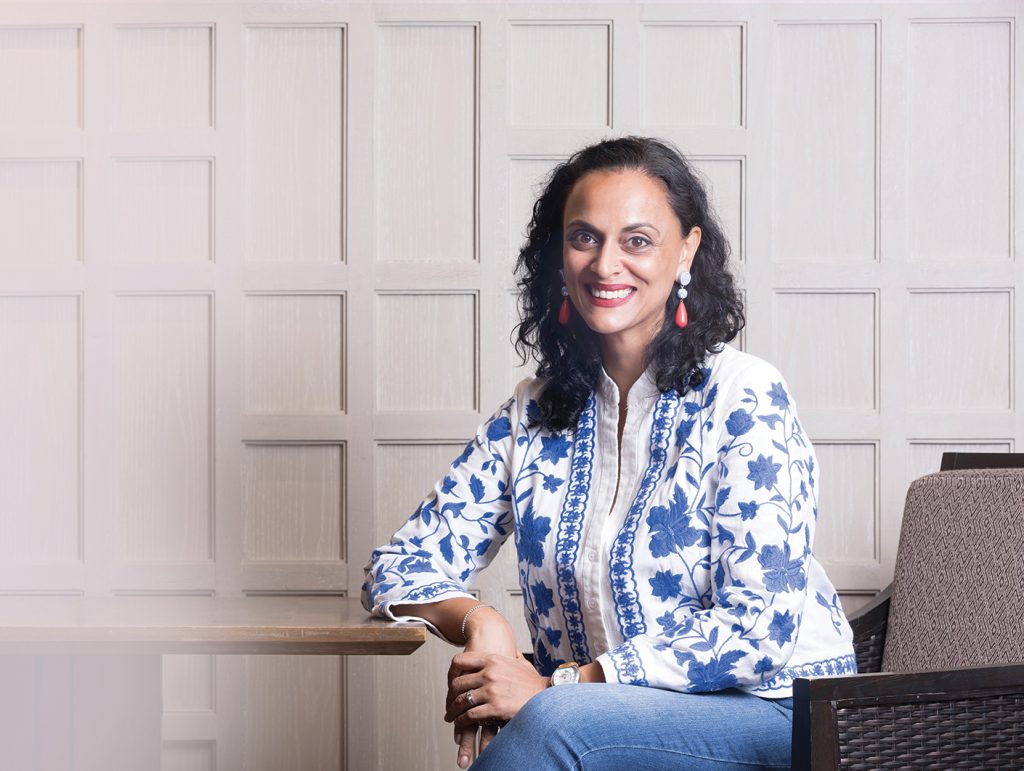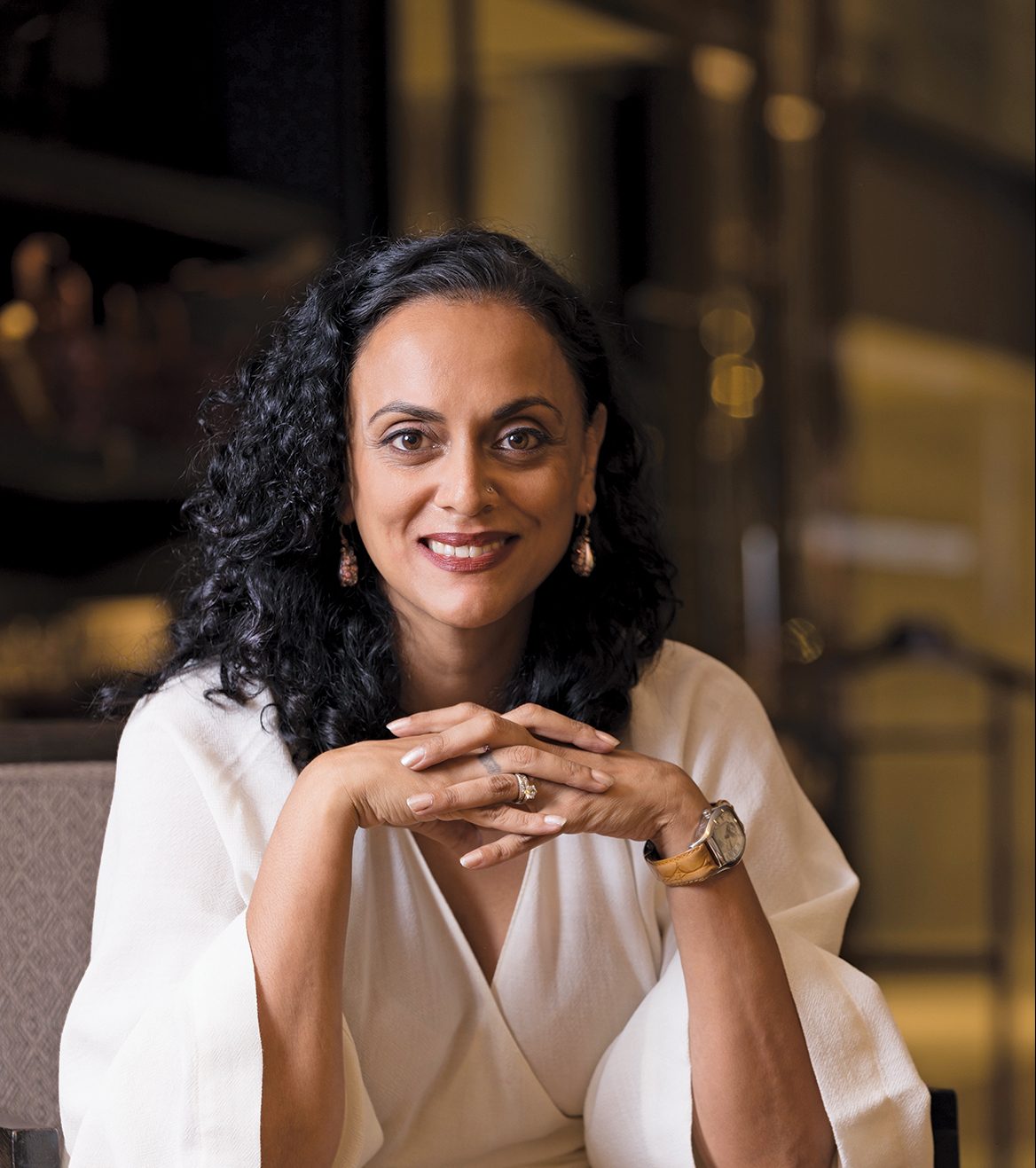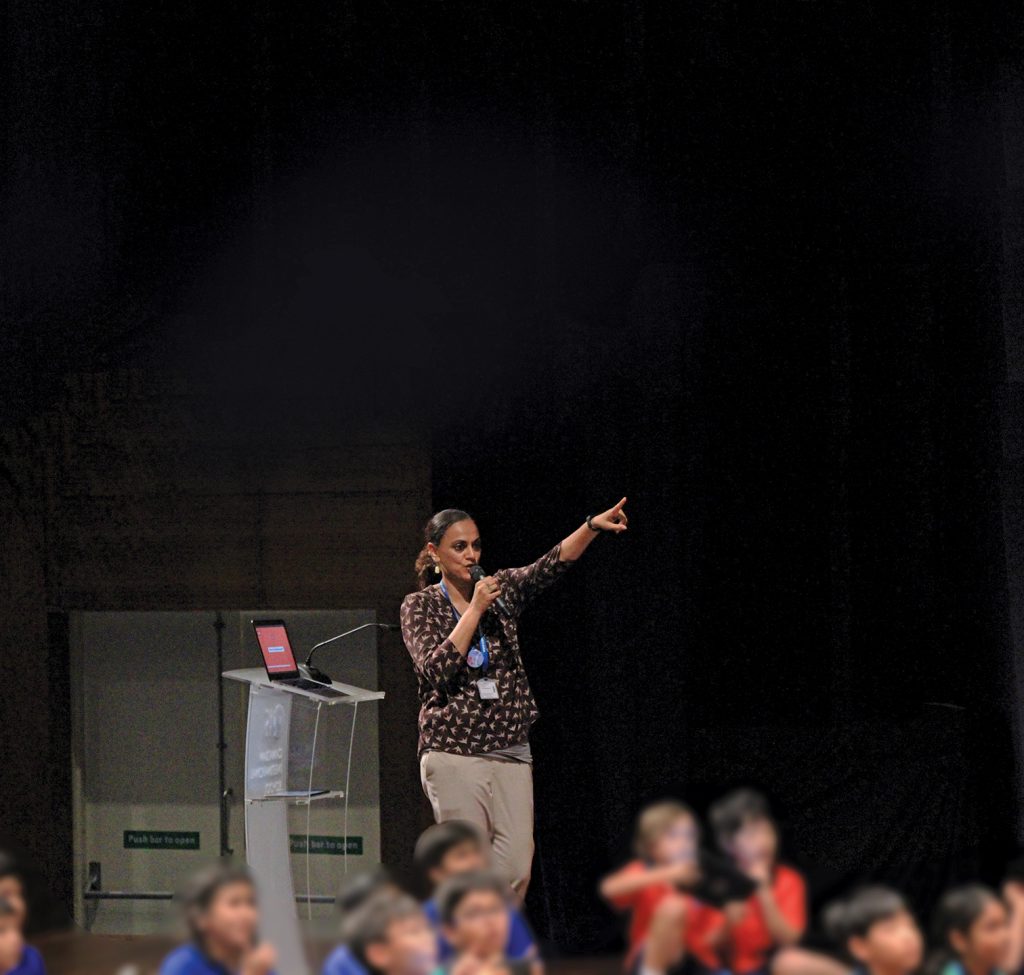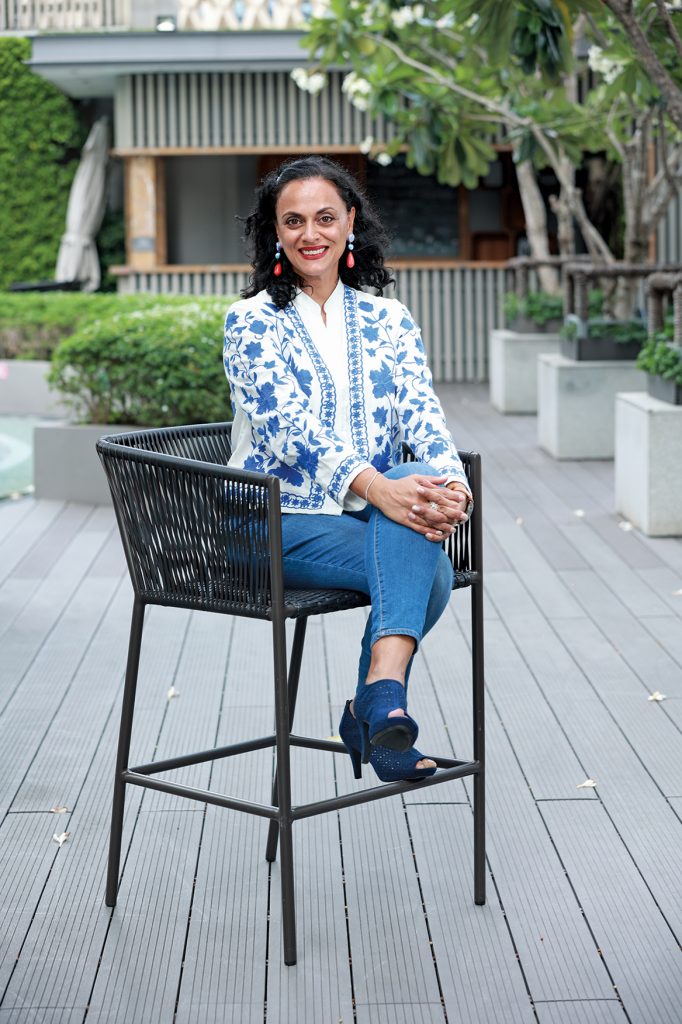Through it all, she stands apart in a class of her own.
By Aiden Jewelle Gonzales
Having a mother and two grandmothers who were in education, I’ve always been keenly aware of the pivotal role our educators and school administrators have played in shaping the fabric of society. Underappreciated but vital, a good teacher always knows how to bring out the best in a student, and they’re often the impetus behind the future path they choose.
With that in mind, I was excited to meet Rekha Sachdej, a woman who’s risen the ranks in the educational field through her own merit, and at a time when these opportunities were not readily available to women from the Thai-Indian society. “When I went to college, not many young, Thai-Indian girls were able to get that opportunity, never mind return from college to pursue a career,” she tells me candidly. “The expectation was to get married, or at least to get married first before even thinking of a career.”
Nevertheless, her hard work and determination bore fruit, and she’s currently the Early years and Elementary School principal at the Canadian International School, Bangalore (CIS), a role that spans the full range of responsibilities, from making sure academic standards are met, to effectively implementing the curriculum, strategic planning, taking care of staff professional growth and the wellbeing of staff, students and parents, as well as budgets, pastoral care, and yearly events, among many others.
Born in Bangkok but having grown up in Kobe, Japan, where her father had a business, Rekha attended the Canadian Academy in Kobe before obtaining her undergraduate degree in Brandeis University, in the U.S. Although her experience in education was varied, from a middle school EAL teacher at Ekkamai International School; to a kindergarten homeroom teacher at ELC – The City School, during which she got her Master’s in Education from Framingham University; to a 2nd and 3rd Grade teacher at St. Johns International School in Guam, where she moved after her marriage; it was in Wells International School in On Nut, after moving back to Bangkok, that she discovered her self-described potential as a leader and administrator. “The school was getting larger and was in need of middle management for the elementary and secondary divisions, and I was approached to take on the role as the elementary school principal,” she recalls.
“At that time, I didn’t think I had the potential or expertise for such a position, but upon reflection, it was a natural next step. I already had over 10 years of experience in various school systems and curricula, the school administration believed in me to take on this role, and if I didn’t at least try, I would have regretted it. I haven’t looked back since!” Since earning her Educational Doctoral degree in Instructional Leadership, Rekha has since fine-tuned her skills and research-based practices, and she talks to Masala about what it has been like leading an educational institution over the years, especially during the recent times of transition in the educational sphere.

How did your journey in education begin, and what drew you to the field in the first place?
I went to university with ‘undecided’ as a major, one of the perks of American university systems where you can take the first couple of years exploring various interests before deciding to focus on one – which worked to my benefit as I had absolutely no idea what I wanted to do with my life.
I explored various subjects, and sociology really piqued my interest. I was fascinated by the study of people and the trends in society, and how we can learn from them to improve the world, so I decided to choose that as my major. I initially had no interest in education, until some friends took an introductory course, and I decided to join them just for fun. I was hooked from the first class. The education programme at my university placed student teachers in elementary school classrooms from the very start, so I was able to experience a real classroom teaching situation right off the bat. It was an amazing feeling to see how I could help students understand concepts, or teach them new skills, as well as build relationships with them and help them reach their potential.
What led you to the Canadian International School, Bangalore, and what has your experience there been like so far?
After being at Wells International School for 10 years, I decided I wanted to spread my wings and see what else was out there. I applied to various schools within Thailand and internationally, and because it’s an extremely competitive field, especially on the administrative level, I received plenty of rejections. But I didn’t let that set me back, and I didn’t give up. I joined CIS in July of 2019, and by March 2020, we went fully remote due to the pandemic, and we have been remote ever since. I was only on the physical campus for about eight months!
I spent the first couple of months getting to know the culture of the school, and really building relationships with my team and creating trust – without trust, any new initiative or decisions that need to be made will be more difficult to have any buy-in or support. That was definitely crucial when we went remote. Running an online programme was new to everyone not just in CIS, but to the entire international school community, and therefore leading the teachers in unknown territory required that strong sense of trust and support that I’d luckily already built up.
As you mentioned, the face of education has changed over the last year. Was the adjustment difficult for parents, staff, and students, and how did you cope with the transition?
Like most schools, we went remote practically overnight. It was a major challenge for students, teachers, and families, as none of us knew what to expect, or how we were going to manage it. The worst part of it all was not knowing how long it would last. From March to June 2020, we scrambled as we had to create and build an online programme while implementing it at the same time. We had to take in government regulations for screen time, as well as what was developmentally and emotionally appropriate for students online.
Initially, parents had a very difficult time understanding why students could not be online in real time. That took a lot of communication and evidence-based data on my part. Teachers also struggled initially, as planning and preparing for online learning takes more time than when physically on campus. Students and families also struggled with balancing school life and home life when the environment was a shared one.
However, over the summer of 2020, we were able to reflect on the experiences of going online, and were able to put policies, protocols, and expectations in place to ensure a strong start to our 2020-2021 remote programme. Teachers also went through training on conducting online classes effectively. By the start of the 2020-2021 academic year, we had a handbook of ‘Remote Learning Policies and Protocols’ with versions for both families and staff, which provided guidelines on ensuring successful online learning, a balanced schedule, as well as virtual events throughout the year to continue to strengthen the sense of community.
You oversaw many of these staff, parents, and teachers, many of whom were going through a lot of anxiety and uncertainty, especially during India’s second wave. What was your experience dealing with that?
Indeed, some families (particularly families with younger students) struggled as oftentimes, both parents would be working, but they also had to manage online learning for their children at home. In such cases, we altered scheduling, workload, and expectations, as we wanted to prioritise family well-being over academics. This was especially important when the second wave hit in April 2021, where we saw more and more of our student’s and staff’s families being affected by COVID. Either family members were falling ill, or students and teachers themselves were falling ill.
We set up counselling services to ensure we were checking up on student and family well-being, and we also had remote learning toolkits, which were physical school resources that families could pick up from school to be used in lessons.
We also conducted some workshops for parents in order for them to learn how to support their child at home, and we implemented a ‘Wellness Wednesday’ where students were given minimal screen time expectations on Wednesdays so that families can focus on personal matters at home, as well as combat Zoom fatigue for both teachers and students.
During this time, were there any silver linings in the changes that had to be made to accommodate the new online learning model?
Yes, I was very impressed with the amount of student agency I was able to observe. Students showed a lot more independence in organising themselves, their day, and communicating with teachers when they needed help. The parents, too, are more aware of what is happening in their children’s learning, which has been great. I hope we can continue to see this when we are back in physical classes.
On a more personal note, you yourself had to cope with the pandemic while most of your family were here in Thailand. How did you deal with the distance and uncertainty?
Starting a new job in a new country, and having most of it online and during a pandemic, has been one of the most intense and challenging situations I have encountered. When we went under lockdown in India, back in March of 2020, my family and I pretty much stayed at home for 10 months. The airports in Thailand and India were closed, and there was so much uncertainty about being able to fly out safely, or whether we’d be able to return.
We were then able to get a repatriation flight via the Thai Consulate to Bangkok. At that time, things in Thailand were pretty much normal and safe, and after 10 months of staying indoors, it was best for my family and children to have somewhat of a normal life!
However, to add to the challenge, I was called back to India to be present in case the school had the chance to physically open for our elementary students. I therefore spent four months in India away from my family, working from home and limiting social interaction. It was definitely a new experience being so isolated from everyone, but living under such restrictive circumstances allowed me to focus on personal matters that I’d overlooked, like my eating and sleeping habits, and pursuing hobbies that I didn’t have time for earlier.
Aside from these recent changes due to the pandemic, how have educational trends changed during your time, and how do you stay on top of them?
Changes in education are constant. It’s much like medicine, where there are always new cures, technology, and research, and education practitioners must also keep abreast of new educational technology and approaches to learning. Fortunately, throughout the academic year, there are a variety of professional development opportunities for educators worldwide, and most schools provide funds for that as part of the benefits in their recruitment package. We teachers and administrators recognise the need to attend such professional development courses to keep up with the fast-changing trends in education.
The pandemic has provided schools with the unique opportunity to revamp, and really rethink what is and isn’t working with the current systems. For example, do schools really need to have a set time from 8am – 3pm? Can students have flexibility in when they need to be physically present at school, and when they can work independently at home? Are standardised tests such as mock exams, the IB, IGCSE, end of term exams, and SATs really the ideal way to measure student achievement? We’re all still learning during this time, and one thing we’ve realised through this crisis is that there definitely needs to be a stronger emphasis on wellbeing, not just for students and parents but also for staff.
Of your many accomplishments, what is one that you’re especially proud of?
Being able to get my Doctoral degree while working and running a home. I’m proud of where I am now, despite the adversities that you often face by being Thai-Indian.
What advice do you have for parents, especially those in the Thai-Indian community?
Not to rush your child or stress them about education or being at the top of their class. Children will learn at their own pace and abilities, and will learn best when they are happy.
Photos taken at the Bangkok Marriott Marquis Queen’s Park in Sukhumvit Soi 22.








